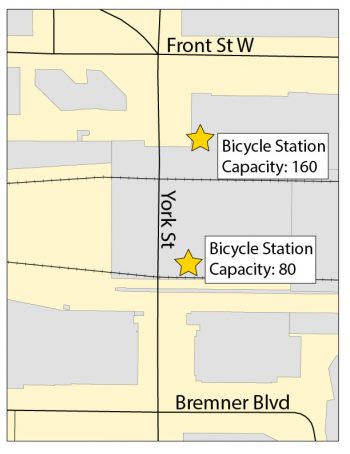ADRM
Senior Member
It’s hilariously short and discontinuous, but the protected bike lanes as part of the Crosstown from Duplex to a few blocks west are nearing completion and looking pretty good (if a bit narrow in portions):





The fiscal conservatives (small "c") say "no". This is why Toronto can't have nicer looking streets.Makes me wish we had buried the power lines as part of the Crosstown project.
As they own them, the burying of the power lines is determined by Toronto Hydro (or Hydro One) and their ability to pay for this 'enhancement' is established by the regulators who set the hydro rates. I am none too fond of "the fiscal conservatives" either but their fingers are not (directly at least) on this. IF the City owned the below ground conduits (as they do in Montreal) it would be up to the City to decide if $$ should be spent on burying wires (which is certainly more aesthetic and also better for the wires) but I am frankly doubtful if the funding would generally be found!The fiscal conservatives (small "c") say "no". This is why Toronto can't have nicer looking streets.
I use the underground parking at Delft station every day. In fact my bike is parked there right now.
From link.
Now compare with the 5,000 bicycle racks in the underground bicycle parking facility at the Central Railway Station of Delft (Netherlands).
I don't think people realize how powerful the synergies are for bikes + transit + flexible and secure bike parking. If you consider that getting people to cycle to a rapid transit station can save the need for a bus trip to/from that station, then the value of bike parking can become quite significant in reduced operating cost for the transit operator. Same goes for letting people leave a bike at their destination station overnight/weekends. Also would increase the catchment area and appeal of transit as people frankly don't want to wait for infrequent buses and may just drive if their destination is more than a short walk from the destination station.I use the underground parking at Delft station every day. In fact my bike is parked there right now.
Your information about Delft Station is slightly incomplete and out of date: as of this year there are 10,100 underground spaces. Like Toronto Union, Delft station has multiple garages. Garage 1 is located directly above the underground platforms, and has 5000 spaces. But that quickly became overcrowded, so they later opened Garage 2 under the adjacent public square which added another 2700 spaces. That still wasn't enough capacity so this year they opened Garage 3 under an adjacent development with another 2400 public spaces.
Map of Delft Station bicycle parking garages, by the City of Delft
View attachment 360513
A large part of the difference in bicycle parking demand between the garages of Toronto and Delft stations can be explained by their operating rules.
In Toronto, you need to buy a membership to the garage, and can park for no more than 48 hours at a time. Most of the station's parking is actually ordinary racks on-street, since people don't want to deal with the costs and/or restrictions of the garages.
Toronto Bicycle Station Terms of use, from toronto.ca
View attachment 360511
View attachment 360510
In Delft, all of the parking is completely free, and you can park up to 14 days in Garages 1 or 3, or 28 days in garage 2. The staffed & monitored garages are the only parking for the station, apart from one bike rack which has a 2h limit (intended as visitor parking for the businesses in the station building). Garages 1 and 3 are open and staffed 24/7, but Garage 2 is only open during the day and then gets locked up at night. I discovered this the hard way a couple weeks ago...
Delft station underground garage terms of use, from delft.nl
View attachment 360515
Most of the bikes in the garages at Delft station are actually owned by people who do not live in Delft. They are secondary bikes which they store at the station and use while they are in town. The 48h limit at City of Toronto garages specifically precludes this use. You can't leave a bike there on Friday afternoon and come pick it up on Monday morning.
Extending the parking limit in City of Toronto garages to 7 days or so would drastically increase their use, by enabling destination-end parking.
However, I do think that Delft has gone too far the opposite direction: by undervaluing the bike parking they now have artificially high demand for spaces. In the city centres of Toronto and Delft, real estate is extremely valuable, so it is generally preferable to steer people toward more space-efficient modes such as bikeshare, rather than leaving a bike sitting in prime real estate for occasional use. Personally I think that Delft should reduce the maximum stay in Garage 1 to something like 4 days, so that those super-convenient spots actually go to the people who frequently use the garage. People who are just storing a bike for occasional use should park at one of the other two, less convenient garages. If there were better bikeshare in Delft, then fewer people would store a bike there to begin with.
I don't think extending the parking duration in Toronto would create out-of-control demand like you find in the Netherlands, because the garages are still paid anyway, and Toronto's bikeshare system is much better suited for commuting than the Dutch OV-Fiets system. The latter is great for day trips, but its pricing structure and business model makes it unaffordable as a last-mile solution for commuters.
Not exactly cycling, but does the city think they can put the genie back in the bottle on electric scooters? These things are popping up everywhere these days.
The cops could commandeer a motorized wheelchair.Yeah ok, as if they'll get anywhere trying to enforce that. Yawn.
Not exactly cycling, but does the city think they can put the genie back in the bottle on electric scooters? These things are popping up everywhere these days.
Just as enforced as riding on the sidewalk. Lazy way to fix issue instead of making appropriate infrastructure.Yeah ok, as if they'll get anywhere trying to enforce that. Yawn.
It might be annoying for operators like Burlington Transit who would lose some ridership to/from stations, but it would be a bit win for the TTC at subway stations, since the they still get the same revenue anyway once the passenger gets on the subway. It would help cut down on the passenger surge on the last couple kilometres of bus routes approaching stations, and reduce the need for short-turn branches.I don't think people realize how powerful the synergies are for bikes + transit + flexible and secure bike parking. If you consider that getting people to cycle to a rapid transit station can save the need for a bus trip to/from that station, then the value of bike parking can become quite significant in reduced operating cost for the transit operator. Same goes for letting people leave a bike at their destination station overnight/weekends. Also would increase the catchment area and appeal of transit as people frankly don't want to wait for infrequent buses and may just drive if their destination is more than a short walk from the destination station.




